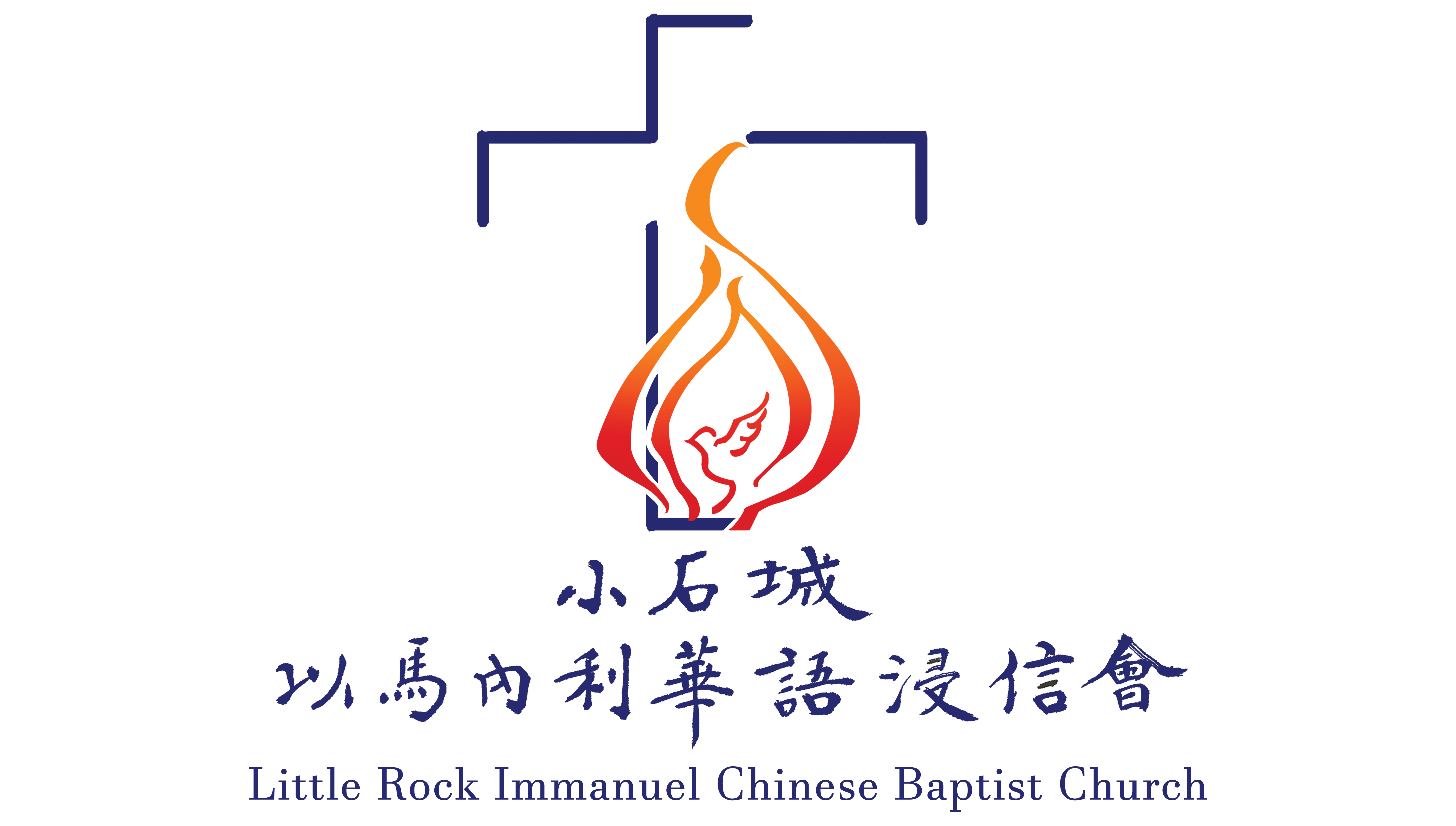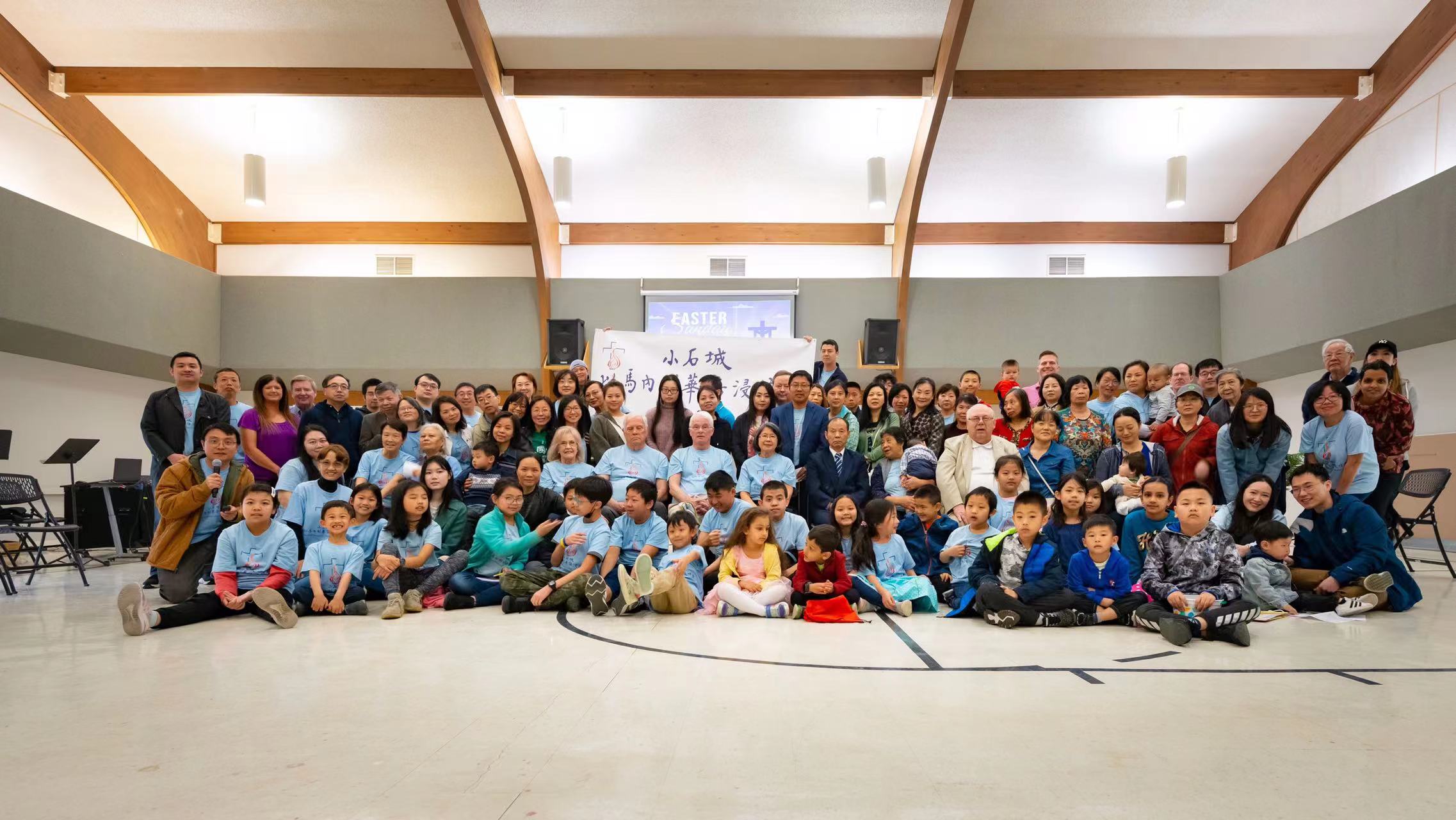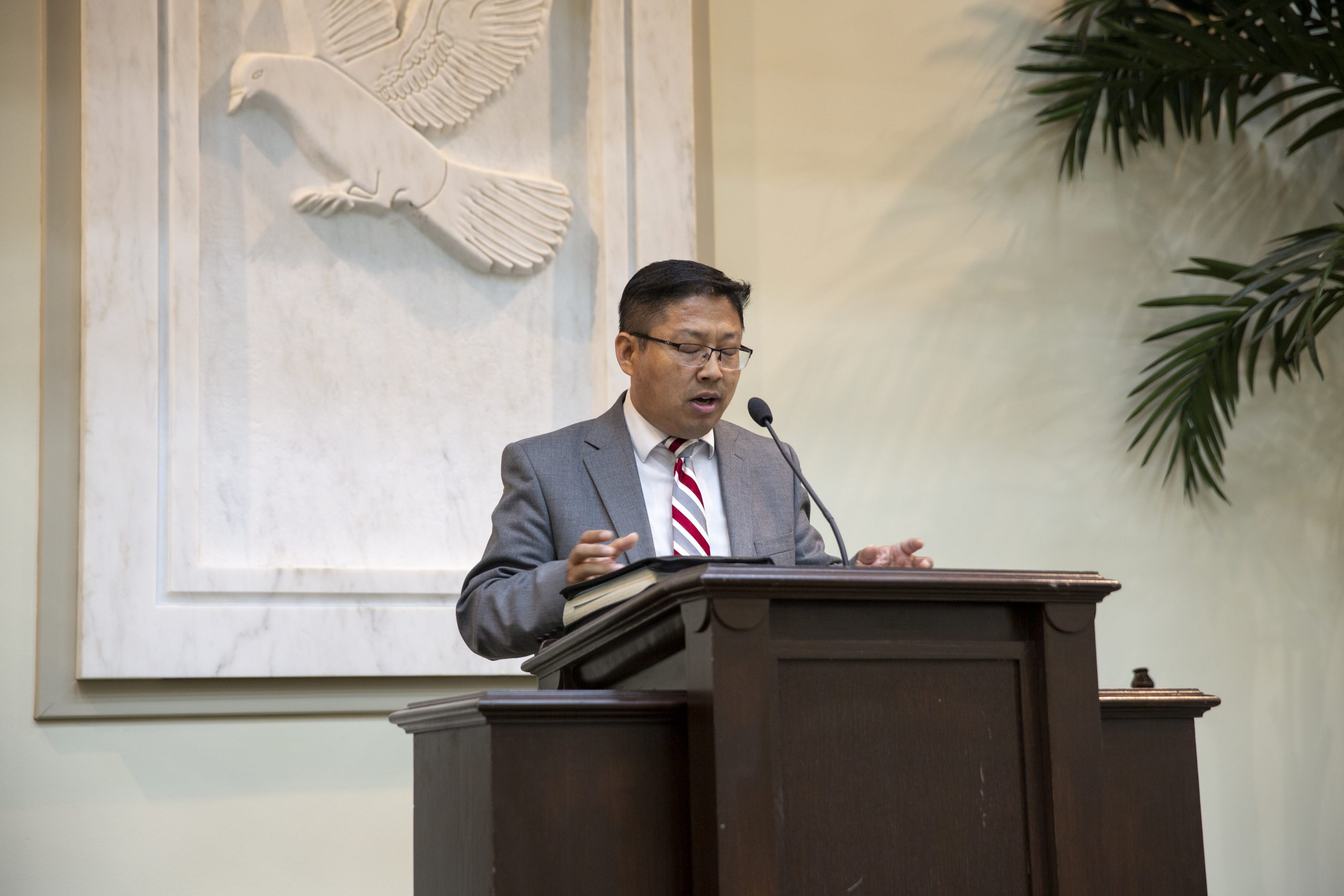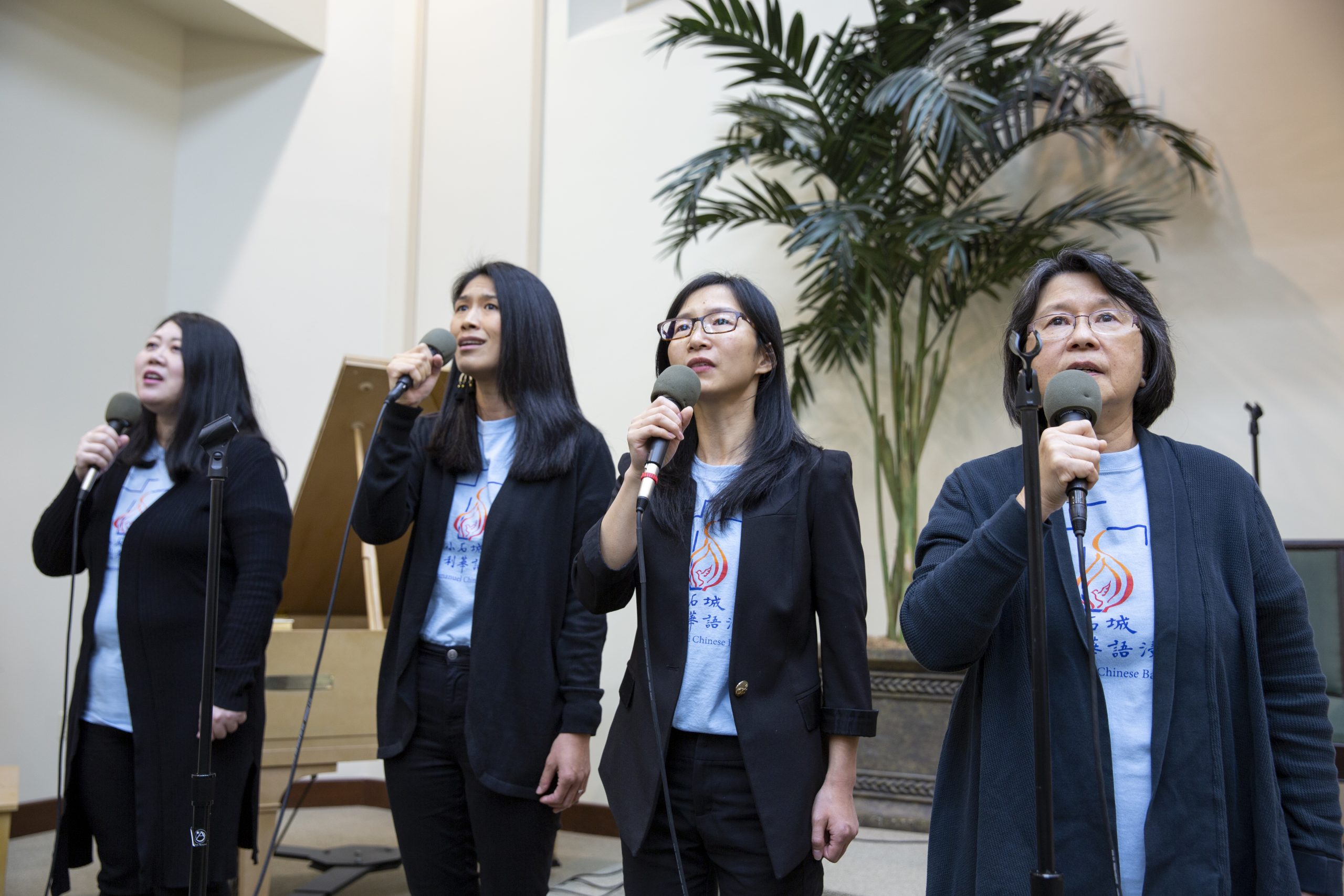亲爱的朋友,欢迎您浏览我们的网站。
“城造在山上,是不能隐藏的”(马太福音5:14下)。我们祈祷,求主使用小石城以马内利华语浸信会,使“这座造在山上的城”能“如日头出现、光辉烈烈”(士师记5:31),在新时代中为主发大光,照亮周围的人,使荣耀归于上帝。
我们诚挚地邀请您来参加我们教会的各项活动!让我们一同认识主,在祂的愛里彼此搀扶,共走天路。以马内利!
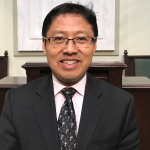 李春海牧师
李春海牧师
最新信息
2024年12月15日 牧者之言
国际宣教祈祷周 2024年12月5日晨祷分享
- “我们拥有永生之道,我们必须说出来……”
- “还有多少百万灵魂在没有听到耶稣的名字的情况下永远离世?”
- “如果主的喜乐成为他们的力量,
工作的幸福将远远弥补工作的艰辛。”
- “We have the words of Eternal Life and we must speak them…”
- “How many million more souls are to pass into eternity without having heard the name of Jesus?”
- “If the joy of the Lord be their strength, the blessedness of the work will more than compensate for its hardships.”
2024年12月8日 牧者之言
神的话临到(拿1:1-3)
上周12/1-7日 是教会第二次禁食祷告周,特摘录12/
默想:
- 经文描述:约在公元前800多年前,神的话临到亚米太(“信实”
之意)的儿子约拿(“鸽子”之意)。 约拿住在靠耶稣长大之处拿撒勒约十里的迦特希弗。 神吩咐他到亚述国首都尼尼微城传悔改的信息, 那里的恶达到主的面前。尼尼微人十分邪恶,以残忍著称。 从迦特希弗到约帕96公里。 约拿没有听从神的吩咐去距离约帕东北1100公里的尼尼微, 却恰巧买了船票(尽管当时一票难求), 逃往距离约帕3200公里的他施。 约拿宁可选择远两倍的路躲避神, 也不愿去距离较近的尼尼微去传道。 - 学习教训
- 要寻求神的话语临到(1:1)。我们要每日读经查考神的话(
约5:39,徒17:11)。有神话语的指示,我们才敢行动。 - 要寻求明白神的心意(1:2)。神是圣洁的神,神恨恶罪恶,
喜愛良善,他恨恶尼尼微城的罪恶。先知要传讲指责罪恶、 劝人悔改的信息。 - 要顺服神的心意(1:3)。约拿的意思是鸽子,
这里他是一只不听话的鸽子,他对神“放鸽子”, 他不仅逃避神的工作,更是逃避神的面。求主怜悯我们, 借着禁食祷告寻求神的面,不要与主的心意背道而驰, 而要借着耶稣的宝血时刻就近神。
祷告项目:为教会2025年未来事工
包括:小石城教会(未来聚会场所)、伯特利教会(未来方向)
祷词:
亲愛的天父,我们感谢你将约拿书赐予我们。
主阿,神的话是我们脚前的灯,路上的光。
主阿,我们要将小石城教会2025年的事工交托在你的手中。
- 求主为我们预备未来的聚会场所。我们自己住在天花板的房屋,
神的教会却还没有长久的居所(该1:4,9)。我们要向主认罪, 求主赦免我们的自我中心。求主为我们教会开出路。 我们为神家焦急如同火烧的心, 求主按着你圣善的美意为我们预备合你心意的居所。 求你按着你时候,赐予我们完全合一的心,让我们全然摆上, 在这件事上遇见你的大能和作为。主阿,我们等候你。当你将“ 云彩从帐幕收上去,我们就起程前往”(出40:36)。 - 我们要为2025年具体事工代祷,求主带领举牌传福音事工;
求主预备暑期圣经学校(VBS)日期、联络人、选用材料、 能有45个儿童和青少年参与,并有足够的成人义工。 求主预备儿童青少年沙龙营地的报名和安排; 求主预备秋季特会讲员、地点等; 求主预备能将每季度守主餐礼调整为每月一次; 求主安排常青团契的带领同工和日期; 求主赐福教会不浪费每次节日(新年、受难节、复活节、父亲节、 母亲节、感恩节、圣诞节等),利用机会大大为主传福音。 愿主的名在我们中间得荣耀,使更多人归到主的名下。
我们要将中国的伯特利教会 2025年事工交托:
- 求主带领以圣灵所赐智慧和恩赐服侍
- 求主安排聚会的安全和平安,各聚会点都兴旺
- 求主带领牧者、同工有能力和权柄,继续大大作主圣工
- 求主赐福学习乐器同工有智慧聪明
- 求主兴起更多弟兄火热事奉主
- 求主带领开展下一代圣工,将我们的子孙带到主面前。
我们要为每一位主的仆人和同工代祷:
- 求主使我们凡事将上帝放在首位(路17:5-10),
从主领受使命和异象 - 求主使我们愛慕真理、学习真理、坚持真理、宣讲真理(箴2: 3-4,约8:32)
- 求主使我们关愛群羊(结34章)
- 求主赐我们口才,将福音尽都传明
- 求主使我们不做瞎眼守望者,不作哑巴狗不能叫唤、
不贪食好酒寻求自己的利益(赛56:10-11), 使我们天天死于旧我,活出基督,高举十字架救恩, 竭力荣耀主的名。以上祷告是奉基督之名,阿门!
The Word of God Comes (Jonah 1:1-3)
Last week, December 1-7, was the church’s second fasting and prayer week. I would like to share with our church family the excerpts of the spiritual meditation and intercession on December 1.
Meditation:
- Scripture description: About BC 800 years ago, the word of God came to Jonah (meaning “dove”), the son of Amittai (meaning “faithful”). Jonah lived in Gath-hepher, about ten miles from Nazareth, where Jesus grew up. God commanded him to preach the message of repentance in Nineveh, the capital of Assyria, where the evil had reached the Lord. The people of Nineveh were very evil and known for their cruelty. It is 96 kilometers from Gath-hepher to Joppa. Jonah did not obey God’s command to go to Nineveh, which is 1,100 kilometers northeast of Joppa, but happened to buy a boat ticket (although it was hard to get a ticket at the time) and fled to Tarshish, which is 3,200 kilometers away from Joppa. Jonah would rather choose a twice-long route to avoid God than to preach in Nineveh, which is closer.
- Lessons Learned
- We need to seek God’s word (1:1). We need to read the Bible and study God’s word every day (John 5:39, Acts 17:11). Only with the guidance of God’s word, can we dare to act.
- We must seek to understand God’s will (1:2). God is a holy God who hates sin and loves goodness. He hates the sin of Nineveh. The prophet must preach a message that denounces sin and urges people to repent.
- We must obey God’s will (1:3). Jonah means a dove, and here he is a disobedient dove. He “released a dove” from God (A Chinese slang, meaning “stand God up”). He not only avoided God’s work, but also avoided God’s presence. May the Lord have mercy on us, seek God’s face through fasting and prayer, and not go against the Lord’s will, but always approach God through the precious blood of Jesus.
Prayer Items: Future Ministry for the Church in 2025
Includes: Little Rock Immanuel Chinese Baptist Church (future meeting place), Bethel Church (future direction), and the service of pastors and co-workers
Prayers:
Dear Heavenly Father, we thank you for giving us the Book of Jonah. Please lead us through the process of praying and reading the scriptures, fasting and praying, so that we can put aside our own ideas, seek you wholeheartedly, turn to you with all our hearts, seek your face, and live a life that pleases you.
Lord, Your word is the lamp before our feet and the light on our path. Please help us to persist in reading your word every day, to have enlightenment in reading the Bible, to obey your word by relying on you, and to live out your word in our lives. May your word come to us through our daily reading of the Bible, meditation and prayer. As long as we have the guidance of your word, we have the courage to move forward.
Lord, we commit the ministry of Little Rock Church in 2025 into your hands.
- May the Lord prepare us a suitable meeting place. Almost every family of our church lives in a house with a ceiling, but the church family of our Lord does not have a long-term place (Hag. 1:4, 9). We must confess our sins to the Lord and ask You to forgive our self-centeredness. May the Lord open a way out for our church. We are anxious for the house of God, and may the Lord prepare a place for us according to Your holy will. Please give us a united spirit, so that we can give ourselves completely and encounter Your power and work in this matter. Lord, we are waiting for You. When You take up “the cloud from the tabernacle, we will set out” (Exod. 40:36).
- Specific ministries in 2025: Ask the Lord to lead the ministry of evangelism with holding sign for Jesus; to prepare the date, coordinator, materials, 45 children and teenagers to participate, and enough adult volunteers for the Vacation Bible School (VBS); the registration and arrangement of the Children and Teenagers for Camp Siloam; the speakers and location of the Fall Retreat; to adjust the Lord’s Supper from quarterly to monthly; to arrange the coordinator and date of the Evergreen Fellowship ; to bless the church not to waste every holiday (Chinese Lunar New Year, Good Friday, Easter, Father’s Day, Mother’s Day, Thanksgiving, Christmas), and make a good use of the opportunity to preach the gospel for the Lord. May the name of the Lord be glorified among us, so that more people will come to the Lord.
We would like to entrust the ministry of Bethel Church in China in 2025 to our Lord:
- Ask the Lord to lead them to serve with the wisdom and gifts given by the Holy Spirit.
- arrange for the safety and peace of the meetings, and that all the gathering points will prosper.
- lead the leaders and co-workers to have the power and authority to continue to do evangelism.
- bless their coworkers who learn musical instruments with wisdom and intelligence
- raise up more brothers to serve Him fervently
- carry out the next generation ministries and bring our children and grandchildren to the Lord.
We pray for every leader and co-worker of the Lord:
- Pray that we will put God first in everything (Luke 17:5-10) and receive mission and vision from the Lord.
- make us love the truth, learn the truth, uphold the truth, and preach the truth (Prov. 2:3-4, John 8:32)
- help us to care for the sheep (Ezekiel 34)
- give us the ability to speak and spread the gospel
- keep us from being blind watchmen, dumb dogs that cannot bark, or greedy eaters and drinkers who seek our own interests (Isaiah 56:10-11). May we die to our old selves daily, live out Christ, uphold the salvation of the cross, and strive to glorify the Lord’s name.
The above prayer is made in the name of Christ. Amen!
2024年12月1日 牧者之言
“警醒感恩”
——2024年小石城以马内利华语浸信会数算主恩
李春海
上周二晨祷会上,王牧师讲到我们要“警醒感恩”(西4:2)。
第一,从1月2日起教会开始晨祷会,每日有10多位,最多次有3
第二,在3月24日10位弟兄姐妹接受浸礼;韩涛、吴红夫妇为主
第三,4月7日复活节庆祝,我们教会和安提阿教会(Antioc
第四,5月24-27日教会支持大人孩子有26位参加明日之光营
第五,6月10-14日教会2位辅导员同工带领11位小朋友第一
第六,从6月18日到21日举行第二次暑期圣经学校。主题:“
第七,教会同工分别于5月18日、6月3日、6月6日、11月
第八, 9月23日常青团契举行聚会,有20多位弟兄姐妹和慕道友参加。
第九,10月18-20人教会举行秋季特会。这次特会以“活出基
第十,11月24日教会举行感恩节崇拜、见证和聚餐。
第十一,感谢主使用每位同工在每周五团契尽心服侍,使儿童、
第十二,教会同工合一,竭力服侍主。主日敬拜诗歌实现现场音乐,
王牧师还提到:人的忘恩是罪性的特点之一,需要不断对付。
“ Being Watchful and Thankful ”
——2024 Counting Blessings at Little Rock Immanuel Chinese Baptist Church
First, the church has started morning prayer meetings since January 2nd. Every day, there were more than 10 brothers and sisters, and at most more than 30 brothers and sisters participated. Since November, God has miraculously turned the morning prayer meeting into a joint prayer meeting between China and the United States, allowing many brothers and sisters in China to join. It has become a bridge of spiritual connection. Brothers and sisters in the Lord watch and pray together and fight the spiritual battle together in the Kingdom of God. The brothers and sisters who participated came from Little Rock, Oklahoma, Texarkana, Fort Worth, Houston in the United States; while Hegang, Jiamusi, Shenzhen, Beijing in China. Prayer is the way the Lord has commanded to rely on Him. The Lord is using prayer to “Enlarge the place of our tent, stretch our tent curtains wide, do not hold back; lengthen our cords, strengthen our stakes. For we will spread out to the right and to the left; our descendants will dispossess nations and settle in their desolate cities.” We must rely on the Holy Spirit to persist in praying!
Second, on March 24, 10 brothers and sisters were baptized; Han Tao and Wu Hong testified for the Lord. This baptism was the largest since the church was founded, including 7 children and teenagers and 3 adults. The fact that these children were baptized and testified by the Lord is the result of the Sunday school teachers and co-workers of the church who have sown seeds with tears and harvested with joy over the years. We give glory to God! Han Tao and Wu Hong experienced a great miracle. During Han Tao’s hospitalization, countless Chinese people poured out their love. Most importantly, the power of the Lord was manifested through the power of everyone’s prayers, allowing Han Tao to experience the valley of the shadow of death and be reborn; Wu Hong also experienced the Lord’s healing and enjoyed peace in Christ. Since then, they have insisted on attending Sunday worships.
Third, on April 7, Easter was celebrated. Our church and Antioch Church held a joint worship service, broke bread and took the Lord’s Supper together, and held a Block Trailer Party and barbecue in the church playground. More than 200 people attended, which was the largest number of participants in the church’s history. Sister Mingfang distributed exquisite sachets embroidered with cross to 59 children. The church held high the cross, witnessed Christ, and impacted the community.
Fourth, from May 24 to 27, the church sponsored 26 adults and children to participate in the Pioneers Conference. We recorded a video as a commemoration (see: https://www.youtube.com/watch?
Fifth, from June 10 to 14, two church counselors led 11 children to participate in the first Camp Siloam, and one child made a decision to follow Jesus. They shared their testimonies on Father’s Day of June 16, talking about their learning experiences, and glorifying the Lord.
Sixth, the second Vacation Bible School (VBS) was held from June 18 to 21. The theme was “SCUBA.” There were 32 children and youth volunteers and 32 adult volunteers. Three children made a decision to follow the Lord. This year our VBS made a loving contribution to the “Brazil Amazon River Mission Project.”
Seventh, our coworkers organized community service activities at the Food Bank on May 18, June 3, June 6, and November 22. 27 brothers and sisters participated in the service on November 23. The adorable one-year-old baby Seth also helped to get potatoes.
Eighth, on September 23, the Evergreen Fellowship held a gathering, with more than 20 brothers and sisters and gospel seekers attending. We must continue to pray for the physical, mental and spiritual health of our elders, and for them to love the Lord more and pray for the salvation of the gospel seekers.
Ninth, October 18-20, the church held a fall retreat. The theme was “Living Out Christ.” Pastor Fu Kaibin delivered several fresh and lively messages, Justice Dundas led the youths, and three UALR students led the children. Brothers and sisters from Jonesboro and Conway and seekers of the truth also came to participate. Pastor Greg Meeks and Sister Grace from Jonesboro shared their testimonies of being called to serve and short-term missions in Africa respectively. The brothers and sisters gained a lot from the retreat.
Tenth, on November 24, the church held Thanksgiving worship, testimony and dinner. Four brothers and sisters gave thanksgiving testimonies. Shen Tiansheng shared that her life journey was like a noble person (God) helping her until today. She attended the Columbus Chinese Christian Church Bible study class in 2020, decided to follow the Lord on November 5, 2023, and was baptized on March 24 this year. She thanked God, thanked her relatives and church family for accompanying her along the way. Aunty Liu Meiying shared that “the way of man is not in himself, and it is not in the man who walks to determine his own steps” (Jer 10:23). Although she experienced setbacks when she came to the United States again, everything has the good intention of the Lord. Joshua shared that he believed in the Lord since he was a child, the difficulties his father encountered in preaching in China, and the process of his going through many twists and turns on his way to school and being protected by God to come to the United States to study. He was baptized on August 18, joined the church, and became a disciple of the Lord. Brother Xue Fei shared that he learned the lesson of patience and waiting in the small matter of driving and was favored by the Lord to avoid disaster. Many gospel seekers came to worship or have meal with us.
Eleventh, thank God for using every coworker to serve wholeheartedly in the Friday evening fellowship, so that children, teenagers, students, scholars and Christians can grow in the Lord. There were several times when brothers and sisters opened their homes and lovingly welcomed everyone to share the beautiful family fellowship.
Twelfth, the church coworkers are united and strive to serve the Lord. The Sunday worship songs have live music, and the children and teenagers serve as pianists. The brothers serve on Mother’s Day. Most of our youths participate in distributing food during every church fellowship dinner.
Pastor Wang also mentioned: Human ingratitude is one of the characteristics of sinfulness, which needs to be dealt with constantly. Without gratitude, without a future. The more grateful we are, the more grace we will receive. Gratitude is not the end of grace, but a key that opens the door to greater grace for us. May the Lord continue to lead our church to a better future by counting His grace!
2024年11月24日 牧者之言
我们为何热愛圣经
范杰瑞和范玛丽莲
耶稣是活的道,圣经是上帝的成文的道!
如果我们想知道如何作为一名基督徒生活,我们来看看耶稣的生活:
- 看看他是谁,他的性格,
- 以及他在地上所做的事情。
但我们也有上帝的话语:
- 而且由于圣经是真实且无误的,圣经就成为我们生活的权威,
就像我们在耶稣生活中看到的一样,因为其中没有冲突。
你曾经坐过只有一条腿或两条腿的“凳子”吗?
- 如果是这样,你会发现很难保持平衡。
- 上次我们在一起时分享了第一条腿——祈祷。
- 今天,我们将分享第二条腿——热愛圣经。
- 明天早上,我们将分享——应许。
- 如果凳子有3 条腿
弗朗西斯·谢弗的名言——“我们该如何生活?”
- 激励我们的心去相信上帝的话语——圣经,
作为我们生活的权威
- 并且活出最丰盛的人生
这就是我们今天早上要开始的地方,基于上帝圣言的权威,
- 让我们的生活充满上帝的话语和圣经,让真理进入我们的头脑:
- 经常聆听宣讲和教导圣经。
- 每年阅读《创世记》1:1 至《启示录》22:21。
- 研究它。
- 背诵它。
- 默想 基于你所听到、阅读、学习和背诵的内容 为了将这些真理从你的头脑转移到你的内心,
- 为什么?
- 因为这些真理如果不进入你的内心,就不会在应用中发挥作用。
“…昼夜思想,这样你就会小心 按照其中所写的一切去遵行”……
[约书亚记 1:8 新国际版]
我们为何热愛圣经?
此时,我们将交替分享一些经文,说明我们喜愛圣经的原因:
玛丽莲:
- 让我跟你们分享一下我为什么热愛圣经?
- [耶利米书 29:11-13] – “因为我知道我向你们所怀的意念”
- 这是上帝写给我们的一封情书。
- [腓立比书 3:10 和合本]
- “更加深入、更加亲密地认识他”
- “更加强烈、更加清晰地感知、认识和理解他属性的奇妙”。
- [诗篇 23: 1-6] – “耶和华是我的牧者”
- 他让我安息
- 他带领我度过最黑暗的时光
- 他的同在——他总是和我在一起
- 我无所求,无所畏惧
杰瑞:
- 让我跟你们分享一下我热愛圣经的几个原因吗?
- [约翰福音 3:16] – “神愛世人,甚至将他的独生子赐给他们,叫一切信他(耶稣)的,
不至灭亡,反得永生。 ” - [约翰福音 3:17] – “因为神差他的儿子降世,不是要定世人的罪,乃是要叫世人因他(
耶稣)得救。” - [诗篇 119:105] – “你的话是我脚前的灯,是我路上的光” – 因此,我可以在他的话语的光中行走。
玛丽莲:
- [诗篇 139:17-18] – “他的意念对我来说何其宝贵”
- 它们的总和有多大
- [罗马书 8:28] –我生活中发生的一切都是为了我的益处和他的荣耀。
- [彼得后书 1:4] – “他已将又宝贵又极大的应许赐给我们”
- 通过这些应许
- 我们可以与他有份
- 他的神圣本质
- 脱离了世上的败坏
杰瑞:
- [哥林多前书 13:13] – “如今常存的有信、有望、有愛,这三样,其中最大的是愛”。
- 我曾经想知道愛怎么会比信和望更重要呢?
- 当我沉思这一点时,我意识到,如果没有上帝对我们的大愛,
- 我们将不再有信或望。
- [约翰一书 1:9] – “我们若认自己的罪” ……我们知道我们的罪能得到赦免,
但是如果没有十诫和我们在圣经中找到的其他真理,我们就不会知道 什么是罪。 - [哥林多前书 1:9] – “神是信实的,你们原是被他所召,好与他儿子,
我们的主耶稣基督,一同得分。”所以,我们不但与神有关系, 而且现在我们可以每天、每时每刻与他(耶稣)保持亲密的个人关系 。
玛丽莲:
- [箴言 3;5-6] –
- 你要专心仰赖耶和华
- 不可依赖自己的聪明
- 在你一切所行的事上 认定他(给予他荣耀)
- 他必指引你的路”。
- [腓立比书 2:13] – 上帝在我们里面工作
- “立志并实践
- 为要讨他喜悦
杰瑞:
- [腓立比书 3:10 和合本] 这节经文的最后几句话是
- “这样我就可以分享他的苦难 不断改变 [在灵里成为他的样式] 甚至对自己死, [都充满盼望]
- 这份盼望是——充满信心的期待
- 有一天我们会复活
- 效法耶稣,与他一起生活在天堂
- 永远[永恒]。
玛丽莲:
- [哥林多前书 2:2] – “因为我曾定了主意,在你们中间不知道别的,
只知道耶稣基督并他钉十字架”。 - [希伯来书 12:2] — “仰望耶稣”… — 我们必须时刻注视着耶稣。
- [罗马书 12:2 ] – “不要效法这个世界,只要心意更新而变化,
叫你们察验何为神的善良、纯全、可喜悦的旨意。”
问题:
- 你为什么喜愛圣经?
- 你最喜欢圣经里的哪一节经文?
(这是范杰瑞和范玛丽莲在11/20/24 小石城以马内利华语浸信会清晨祷告会上的分享。特此感谢)
WHY WE LOVE THE BIBLE
Jerry & Marilyn Fine
JESUS IS THE LIVING WORD & THE BIBLE IS THE WRITTEN WORD OF GOD!
IF WE WANT TO KNOW HOW TO LIVE AS A CHRISTIAN, WE LOOK AT THE LIFE OF JESUS:
- TO SEE WHO HE WAS, HIS CHARACTER,
- AND WHAT HE DID HERE ON EARTH.
BUT WE ALSO HAVE THE WRITTEN WORD OF GOD:
- AND BECAUSE THE BIBLE IS TRUE AND WITHOUT ERROR, THE BIBLE BECOMES THE AUTHORITY IN OUR LIVES AS WELL AS WHAT WE SEE IN THE LIFE OF JESUS, BECAUSE THERE IS NO CONFLICT.
Have you ever sat on a 1 OR 2 LEGGED “STOOL”?
- If so, you found out it was hard to keep your balance.
- The LAST TIME we were together we talked about THE FIRST LEG – PRAYER.
- TODAY we will talk about the SECOND LEG – LOVE FOR THE BIBLE.
- TOMORROW morning, we will talk about – PROMISES.
- It is easier to stay BALANCED AND UPRIGHT IF THE STOOL HAS
3 LEGS
FRANCIS SHAEFFER’S FAMOUS QUOTE – “HOW SHALL WE THEN LIVE?”
- STIRS OUR HEARTS TO BELIEVE THE WORD OF GOD, THE BIBLE,
AS THE AUTHORITY IN OUR LIVES
- AND LIVE LIFE TO IT’S FULLEST
AND THAT IS WHERE WE WILL START THIS MORNING, BASED ON THE AUTHORITY OF GOD’S WORD HOW SHOULD WE LIVE?
- SATURATING OUR LIVES WITH THE WORD OF GOD, THE BIBLE, GET’S THE TRUTH INTO OUR HEAD:
- HEAR IT PREACHED & TAUGHT REGULARLY.
- READ IT FROM GENESIS 1:1 THROUGH REVELATION 22:21, EVERY YEAR.
- STUDY IT.
- MEMORIZE IT.
- MEDITATE ON WHAT YOU HAVE HEARD, READ, STUDIED, AND MEMORIZED TO MOVE THESE TRUTHS FROM YOUR HEAD TO YOUR HEART,
WHY?
- BECAUSE THESE TRUTHS WILL NEVER WORK THERE WAY OUT IN APPLICATION UNTIL THEY GET TO YOUR HEART.
“…MEDITATE ON IT DAY AND NIGHT, SO THAT YOU WILL BE CAREFUL TO DO EVERYTHING WRITTEN IN IT” …[JOSHUA 1:8 NIV84]
WHY WE LOVE THE BIBLE?
AT THIS TIME, WE WILL ALTERNATE BACK AND FORTH ARE
SOME SCRIPTURES WHY WE LOVE THE BIBLE:
MARILYN:
- LET ME SHARE WITH YOU WHY I LOVE THE BIBLE?
- [Jeremiah 29:11-13] – “FOR I KNOW THE PLANS I HAVE FOR YOU”
- IT IS GOD’S LOVE LETTER TO US.
- [Philippians 3:10 AMPC] –
- “TO KNOW HIM MORE DEEPLY & INTIMATELY”
- “TO PERCIEVE, RECOGNIZE AND UNDERSTAND THE WONDERS OF HIS PERSON MORE STRONGLY AND MORE CLEARLY”.
- [Psalms 23: 1-6] – ‘THE LORD IS MY SHEPHERD”
- HE GIVES ME REST
- HE LEADS ME IN THE DARKEST OF TIMES
- HIS PRESENCE – HE IS ALWAYS WITH ME
- I HAVE NO WANT – NO FEARS
JERRY:
- LET ME SHARE WITH YOU A FEW REASONS WHY I LOVE THE BIBLE?
- [John 3:16] – “FOR GOD SO LOVED THE WORLD THAT HE GAVE HIS ONLY BEGOTTEN SON, THAT WHOEVER BELIVES IN HIM (JESUS) SHOULD NOT PERISH BUT HAVE EVERLASTING LIFE.” …
- [John 3:17] – “FOR GOD DID NOT SEND HIS SON INTO THE WORLD TO CONDEMN THE WORLD, BUT THAT THE WORLD THROUGH HIM (JESUS) MIGHT BE SAVED.”
- [Psalm 119:105] – “YOUR WORD IS A LAMP TO MY FEET AND A LIGHT TO MY PATH” – THEREFORE, I CAN WALK IN THE LIGHT OF HIS WORD.
MARILYN:
- [Psalm 139:17-18] – “HIS THOUGHTS ARE PRECIOUS TO ME”
- HOW GREAT IS THE SUM OF THEM
- [Romans 8:28] – EVERYTHING THAT HAPPENS IN MY LIFE IS FOR MY GOOD AND HIS GLORY.
- [2 Peter 1:4] – “HE HAS GIVEN TO US EXCEEDINGLY GREAT & PRECIOUS PROMISES”
- THAT THROUGH THESE PROMISES
- WE MAY BE PARTAKERS
- OF HIS DEVINE NATURE
- HAVING ESCAPED THE CORRUPTION THAT IS IN THE WORLD
JERRY:
- [1 Corinthians 13:13] – “AND NOW ABIDE FAITH, HOPE, LOVE, THESE THREE; BUT THE GREATEST OF THESE IS LOVE”.
- I USE TO WONDER HOW CAN LOVE BE MORE IMPORTANT THAN FAITH & HOPE?
- BUT WHEN I MEDITATED ON THIS THOUGHT, I COULD SEE THAT WITHOUT GOD’S GREAT LOVE FOR US,
- WE WOULD NOT HAVE FAITH OR HOPE.
- [1 John 1:9] – “IF WE CONFESS OUR SINS” …WE KNOW THAT WE CAN HAVE FORGIVENESS OF OUR SINS, BUT WE WOULDN’T KNOW WHAT SIN IS IF IT WERE NOT FOR THE TEN COMMNDMENTS AND OTHER TRUTHS WE FIND IN THE BIBLE.
- [1 Corinthians 1:9] – “GOD IS FAITHFUL, BY WHOM YOU WERE CALLED INTO THE FELLOWSHIP OF HIS SON, JESUS CHRIST OUR LORD.” SO, WE NOT ONLY HAVE A RELATIONSHIP WITH GOD BUT NOW WE CAN HAVE AN INTIMATE AND PERSONAL FELLOWSHIP WITH HIM (JESUS) DAY BY DAY AND MOMENT BY MOMENT.
MARILYN:
- [Proverbs 3;5-6] –
- ‘TRUST IN THE LORD WITH ALL YOUR HEART
- DO NOT LEAN ON YOUR OWN UNDERSTANDING
- IN ALL YOUR WAYS ACKNOWLEDGE HIM (GIVE HIM THE GLORY)
- & HE WILL DIRECT YOUR PATH”.
- [Philippians 2:13] – GOD IS WORKING IN US
- “TO WILL AND TO DO
- FOR HIS GOOD PLEASURE”
JERRY:
- [Philippians 3:10 AMPC] – THE VERY LAST WORDS OF THIS VERSE ARE
- “AND THAT I MAY SO SHARE HIS SUFFERINGS AS TO BE CONTINUALLY TRANSFORMED [IN SPIRIT INTO HIS LIKENESS EVEN] TO HIS DEATH, [IN THE HOPE)
- THAT HOPE IS – A CONFIDENT EXPECTATION
- THAT ONE DAY WE WILL BE RESURRECTED
- LIKE JESUS AND LIVE WITH HIM IN HEAVEN
- FOREVER .
MARILYN:
- [1 Corinthians 2:2] – “FOR I DETERMINED NOT TO KNOW ANYTHING AMONG YOU EXCEPT JESUS CHRIST AND HIM CRUCIFIED”.
- [Hebrews 12:2] – “LOOKING UNTO JESUS” … – WE MUST ALWAYS KEEP OUR EYES ON JESUS.
- [Romans 12:2] – “AND DO NOT BE CONFORMED TO THIS WORLD, BUT BE TRANSFORMED BY THE RENEWING OF YOUR MINDS, THAT YOU MAY PROVE WHAT IS THE GOOD AND ACCEPTABLE & PERFECT WILL OF GOD.”
QUESTIONS:
- WHY DO YOU LOVE THE BIBLE?
- WHAT IS YOUR FAVORITE VERSE IN THE BIBLE?
(We are grateful to Jerry and Marilyn Fine for their sharing at our early morning prayer meeting of LRICBC on 11/20/24)
历史归档
- December 2025 (1)
- November 2025 (5)
- October 2025 (4)
- September 2025 (4)
- August 2025 (4)
- July 2025 (4)
- June 2025 (4)
- May 2025 (5)
- April 2025 (5)
- March 2025 (5)
- February 2025 (4)
- January 2025 (4)
- December 2024 (5)
- November 2024 (5)
- October 2024 (4)
- September 2024 (4)
- August 2024 (5)
- July 2024 (4)
- June 2024 (5)
- May 2024 (4)
- April 2024 (4)
- March 2024 (7)
- February 2024 (5)
- January 2024 (4)
- December 2023 (8)
- November 2023 (10)
- October 2023 (6)
- September 2023 (4)
- August 2023 (5)
- July 2023 (6)
- June 2023 (6)
- May 2023 (4)
- April 2023 (13)
- March 2023 (4)
- February 2023 (4)
- January 2023 (7)
- December 2022 (14)
- November 2022 (4)
- October 2022 (2)
- September 2022 (8)
- August 2022 (5)
- July 2022 (6)
- June 2022 (7)
- May 2022 (5)
- April 2022 (12)
- March 2022 (6)
- February 2022 (5)
- January 2022 (8)
- December 2021 (8)
- November 2021 (4)
- October 2021 (3)
- January 2019 (1)
